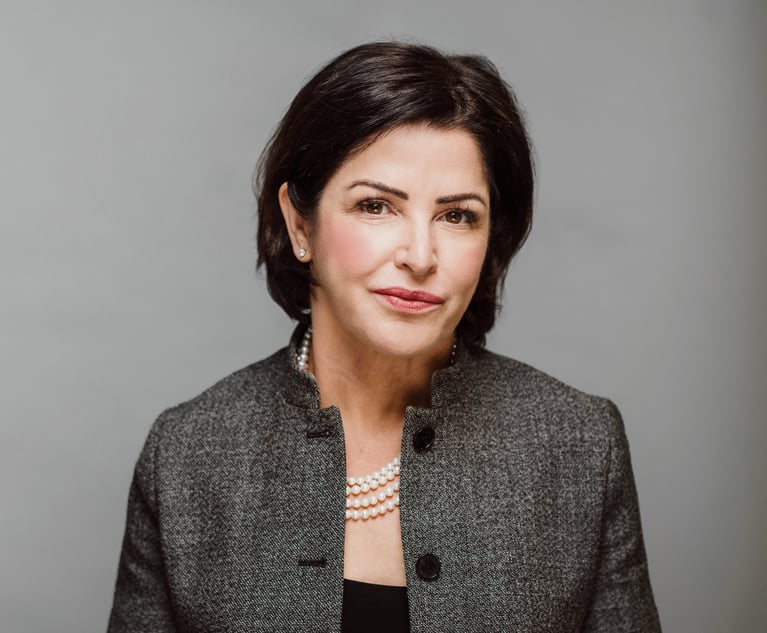Coronavirus Crisis Management
Legal departments in all organization types must be proactive to mitigate the effects of this crisis.
February 26, 2020 at 02:13 PM
5 minute read
The original version of this story was published on Corporate Counsel

As the novel coronavirus (2019-nCov, "Covid-19″) spreads at speed beyond Wuhan, China and other Asian economic hubs, to the Middle East, the Americas and Europe, the global community faces worsening economic repercussions and the threat of imminent pandemic. Given its increasing impact on the global supply chain, the economy, and the people who make the world turn, it is less about whether organizations will be affected, and more about when and how?
Legal departments in all organization types must be proactive to mitigate the effects of this crisis.
What We Are Seeing
Our global clients across the spectrum of industries are facing an almost unprecedented impact or threat to their global operations. Factories in China either remain closed or are working at a fraction of their total capacity, frequently less than 10 percent. Shipping containers are stacking up at ports or are facing rerouting as dock workers stay home. Trucking routes across China are severed due to quarantine measures. Many countries have suspended flights to and from virus-hit regions, reducing air freight capacity. Factories in Vietnam, Thailand, Japan, Korea, Mexico, and the United States are also reducing capacity due to shortages of input parts from China, a trend likely to continue as the crisis continues.
Further, retail, restaurant, and tourism industry are devastated as people stay home to avoid the virus.
Regardless of sector, our global clients are impacted by delayed or aborted corporate transactions (and a general slowdown in M&A and IPO activity in certain regions); sharp decreases in corporate earnings; increasing concerns over commercial viability of contracts; increase in the use of force majeure to cancel orders; cancellation of major public and private sector leisure, cultural and sporting events; and public relations issues.
We have set out below how lawyers in global organizations can implement a thoughtful and streamlined approach to leading through a global public health crisis.
Legal Risk Emanating From a Public Health Crisis
Global public health crises such as Covid-19 are, thankfully, relatively infrequent—SARS (2003) and the Ebola crisis (2014-2016) are the most recent similar examples—but this can mean that response protocols within organizations receive less attention than those for more frequent crisis types and that companies lack experience in responding to these incidents.
Even the most prepared organizations may face significant challenges managing these events because staff, including lawyers and senior leadership, are unable to work effectively because of remote work protocols or they are unwell, quarantined, or stranded overseas.
As a result of Covid-19, organizations face significant potential legal issues, including:
- issues arising from the closure (temporary or indefinite) of factories, sites or stores, giving rise to contractual and other disputes;
- workplace health and safety;
- employee grievances related to work and health privacy/data protection matters under local laws;
- increasing travel restrictions;
- a myriad of supply chain risk (including risks associated with air and sea shipping); and
- consumer concern regarding goods/materials originating from virus-hit regions leading to breaches of contract.
If Covid-19 has or might have an impact upon an organization's people or operations, the organization should take swift steps to assemble an incident response team and, where necessary, external legal advisors, to best adapt to the rapidly-developing situation.
Strategic Leadership Considerations
Employees, customers, and the public all expect competent leadership in tough times. To achieve this, organizations should ensure that they:
- have the policies and protocols in place to promote the health and welfare of their employees and representatives—including appropriate dissemination of key medical information and updates regarding Covid-19 and, where necessary, emergency medical treatment and travel/evacuation protocols;
- activate regular and clear internal reporting channels;
- are able to communicate to clients, customers, and vendors the current status of factories based on localized information;
- deploy business continuity plans throughout their operations—particularly those exposed to supply chain risk or where site closures are required—including increased use of technology to support business function;
- have a clear understanding of the terms of any contracts which are impacted by Covid-19;
- understand local employment and data protection laws with a view to understanding: (i) how to implement protective measures in the workplace; (ii) the potential need to report employee information to local health authorities; and (iii) mandatory quarantines, as well as long-term shutdowns of offices and stores;
- where necessary, maintain key lines of communication with relevant government departments, both home and overseas; and
- deploy public relations and reputation management procedures including internal and external communication protocols—particularly involving social media.
By devising and following a strategic plan that covers these steps, lawyers in affected organizations have the opportunity to lead them through this crisis and to ensure that they are equipped to emerge stronger, more resilient and better prepared for the next unforeseen event.
Lillian Hardy is a Partner at Hogan Lovells in Washington D.C. where she heads the firm's multidisciplinary, global crisis management practice, the HL Crisis Leadership Team. Benjamin Kostrzewa and Byron Phillips are attorneys in the firm's Hong Kong office.
This content has been archived. It is available through our partners, LexisNexis® and Bloomberg Law.
To view this content, please continue to their sites.
Not a Lexis Subscriber?
Subscribe Now
Not a Bloomberg Law Subscriber?
Subscribe Now
NOT FOR REPRINT
© 2025 ALM Global, LLC, All Rights Reserved. Request academic re-use from www.copyright.com. All other uses, submit a request to [email protected]. For more information visit Asset & Logo Licensing.
You Might Like
View All

Pallas Partners Founder On the Disputes Trends to Look Out For in 2025
4 minute read
What to Expect From Teresa Ribera, the EU‘s New Competition Commissioner
6 minute readLaw Firms Mentioned
Trending Stories
- 1Uber Files RICO Suit Against Plaintiff-Side Firms Alleging Fraudulent Injury Claims
- 2The Law Firm Disrupted: Scrutinizing the Elephant More Than the Mouse
- 3Inherent Diminished Value Damages Unavailable to 3rd-Party Claimants, Court Says
- 4Pa. Defense Firm Sued by Client Over Ex-Eagles Player's $43.5M Med Mal Win
- 5Losses Mount at Morris Manning, but Departing Ex-Chair Stays Bullish About His Old Firm's Future
Who Got The Work
J. Brugh Lower of Gibbons has entered an appearance for industrial equipment supplier Devco Corporation in a pending trademark infringement lawsuit. The suit, accusing the defendant of selling knock-off Graco products, was filed Dec. 18 in New Jersey District Court by Rivkin Radler on behalf of Graco Inc. and Graco Minnesota. The case, assigned to U.S. District Judge Zahid N. Quraishi, is 3:24-cv-11294, Graco Inc. et al v. Devco Corporation.
Who Got The Work
Rebecca Maller-Stein and Kent A. Yalowitz of Arnold & Porter Kaye Scholer have entered their appearances for Hanaco Venture Capital and its executives, Lior Prosor and David Frankel, in a pending securities lawsuit. The action, filed on Dec. 24 in New York Southern District Court by Zell, Aron & Co. on behalf of Goldeneye Advisors, accuses the defendants of negligently and fraudulently managing the plaintiff's $1 million investment. The case, assigned to U.S. District Judge Vernon S. Broderick, is 1:24-cv-09918, Goldeneye Advisors, LLC v. Hanaco Venture Capital, Ltd. et al.
Who Got The Work
Attorneys from A&O Shearman has stepped in as defense counsel for Toronto-Dominion Bank and other defendants in a pending securities class action. The suit, filed Dec. 11 in New York Southern District Court by Bleichmar Fonti & Auld, accuses the defendants of concealing the bank's 'pervasive' deficiencies in regards to its compliance with the Bank Secrecy Act and the quality of its anti-money laundering controls. The case, assigned to U.S. District Judge Arun Subramanian, is 1:24-cv-09445, Gonzalez v. The Toronto-Dominion Bank et al.
Who Got The Work
Crown Castle International, a Pennsylvania company providing shared communications infrastructure, has turned to Luke D. Wolf of Gordon Rees Scully Mansukhani to fend off a pending breach-of-contract lawsuit. The court action, filed Nov. 25 in Michigan Eastern District Court by Hooper Hathaway PC on behalf of The Town Residences LLC, accuses Crown Castle of failing to transfer approximately $30,000 in utility payments from T-Mobile in breach of a roof-top lease and assignment agreement. The case, assigned to U.S. District Judge Susan K. Declercq, is 2:24-cv-13131, The Town Residences LLC v. T-Mobile US, Inc. et al.
Who Got The Work
Wilfred P. Coronato and Daniel M. Schwartz of McCarter & English have stepped in as defense counsel to Electrolux Home Products Inc. in a pending product liability lawsuit. The court action, filed Nov. 26 in New York Eastern District Court by Poulos Lopiccolo PC and Nagel Rice LLP on behalf of David Stern, alleges that the defendant's refrigerators’ drawers and shelving repeatedly break and fall apart within months after purchase. The case, assigned to U.S. District Judge Joan M. Azrack, is 2:24-cv-08204, Stern v. Electrolux Home Products, Inc.
Featured Firms
Law Offices of Gary Martin Hays & Associates, P.C.
(470) 294-1674
Law Offices of Mark E. Salomone
(857) 444-6468
Smith & Hassler
(713) 739-1250









